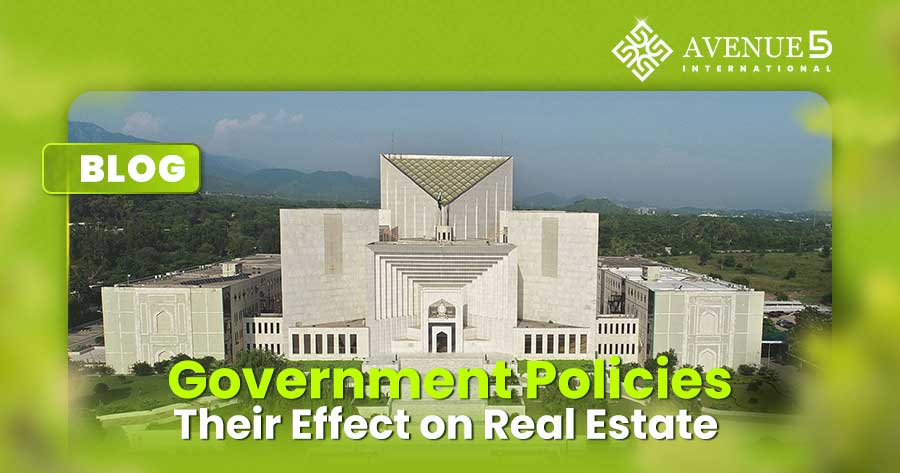
Government policies significantly influence the Pakistani real estate market, shaping trends, investment patterns, and overall stability. However, in Pakistan, the real estate sector plays a pivotal role in the country’s economic landscape. Government policies and regulations have a profound impact on the dynamics of this market, influencing property prices, investment trends, and overall growth. In this blog post, we will explore the relationship between government policies and the Pakistani real estate market.
Taxation Policies

One of the critical factors shaping trends in the real estate market is the taxation policy implemented by the government. Changes in property taxes, capital gains tax, and other related levies can significantly influence investor behavior, thus playing a pivotal role in determining the trajectory of the real estate sector. For instance, a reduction in property taxes may encourage investment and spur growth in the real estate market, creating a positive trend in property acquisition and development. Conversely, an increase in these taxes might lead to a slowdown in investment, affecting both residential and commercial real estate trends. Therefore, staying attuned to evolving taxation policies is essential for investors and stakeholders seeking to navigate the dynamic landscape of the real estate market.
Legal Reforms:
The legal framework surrounding real estate transactions is crucial for ensuring a transparent and secure environment. Government initiatives to streamline property registration processes, reduce bureaucratic hurdles, and enhance the legal protection of property rights can positively impact the real estate market. Such reforms can attract both local and foreign investors, fostering a more vibrant property market.
Infrastructure Development:
Government investments in infrastructure projects, such as roads, bridges, and public transportation, can have a direct impact on property values. Improved connectivity and accessibility often lead to increased demand for properties in those areas. As a result, real estate developers may shift their focus to regions undergoing significant infrastructure development.
Housing Schemes and Subsidies:

Governments may introduce housing schemes and subsidies to promote affordable housing for the general population. These initiatives can stimulate demand for housing, particularly among lower-income groups. Developers may also benefit from incentives provided by the government to engage in affordable housing projects.
Interest Rates and Monetary Policies:
Changes in interest rates and monetary policies can influence mortgage rates and financing options, affecting the purchasing power of potential homebuyers. Higher interest rates may lead to a slowdown in the real estate market as borrowing becomes more expensive, while lower rates may stimulate demand.
Foreign Direct Investment (FDI):

Government policies regarding foreign direct investment in the real estate sector can impact the overall market dynamics. Encouraging FDI can bring in additional capital, technology, and expertise, contributing to the growth and development of the real estate industry.
In conclusion, the Pakistani real estate market is intricately linked to government policies and regulations. Investors, developers, and homeowners alike closely monitor policy changes that can shape the landscape of the property market. A well-balanced and proactively managed policy framework can contribute to a stable, transparent, and thriving real estate sector, ultimately benefiting the broader economy and society as a whole.
Explore the possibilities, discover the charm, and make Bahria Town Islamabad your home.
Visit Avenue5International for the latest real estate news and blogs.
Visit Times Square & The Dunes Mall for our project information.

